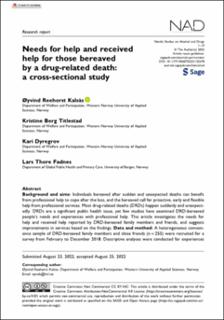| dc.contributor.author | Kalsås, Øyvind Reehorst | |
| dc.contributor.author | Titlestad, Kristine Berg | |
| dc.contributor.author | Dyregrov, Kari | |
| dc.contributor.author | Fadnes, Lars Thore | |
| dc.date.accessioned | 2023-09-06T08:32:06Z | |
| dc.date.available | 2023-09-06T08:32:06Z | |
| dc.date.created | 2022-10-11T19:39:57Z | |
| dc.date.issued | 2023 | |
| dc.identifier.issn | 1455-0725 | |
| dc.identifier.uri | https://hdl.handle.net/11250/3087671 | |
| dc.description.abstract | Background and aims: Individuals bereaved after sudden and unexpected deaths can benefit from professional help to cope after the loss, and the bereaved call for proactive, early and flexible help from professional services. Most drug-related deaths (DRDs) happen suddenly and unexpectedly. DRDs are a significant public health issue, yet few studies have examined DRD-bereaved people’s needs and experiences with professional help. This article investigates the needs for help and received help reported by DRD-bereaved family members and friends, and suggests improvements in services based on the findings. Data and method: A heterogeneous convenience sample of DRD-bereaved family members and close friends (n = 255) were recruited for a survey from February to December 2018. Descriptive analyses were conducted for experiences with professional help, chi-square analyses to find predictors for help needs and received help, and logistic regression analysis to find predictors for satisfaction with the help provided. Results: Most DRD-bereaved individuals reported a need for professional help after the death regardless of family relation to the deceased, and about half of the participants received help. Nearly half of them were satisfied with the help. Our results indicated higher satisfaction with help among older bereaved, and the participants who received help from a crisis team or psychotherapist. The latter was particularly stated for younger participants. Few participants with children in the family reported that the children had received help, and less than one-third were satisfied with this help. Conclusion: The study shows that younger age groups and children need particular recognition, and a family perspective from services is essential. When assessing the help needs of the DRD-bereaved, relations of both psychological and biological closeness should be recognised. Help efforts should be tailored according to established knowledge of the provided help that bereaved populations deem effective. | en_US |
| dc.language.iso | eng | en_US |
| dc.publisher | Sage | en_US |
| dc.rights | Navngivelse-Ikkekommersiell 4.0 Internasjonal | * |
| dc.rights.uri | http://creativecommons.org/licenses/by-nc/4.0/deed.no | * |
| dc.title | Needs for help and received help for those bereaved by a drug-related death: a cross-sectional study | en_US |
| dc.type | Peer reviewed | en_US |
| dc.type | Journal article | en_US |
| dc.description.version | publishedVersion | en_US |
| dc.rights.holder | © The Author(s) 2023 | en_US |
| dc.source.pagenumber | 19 | en_US |
| dc.source.journal | Nordic Studies on Alcohol and Drugs (NAD) | en_US |
| dc.identifier.doi | 10.1177/14550725221125378 | |
| dc.identifier.cristin | 2060667 | |
| dc.relation.project | Norges forskningsråd: 300732 | en_US |
| cristin.ispublished | true | |
| cristin.fulltext | original | |
| cristin.qualitycode | 1 | |

